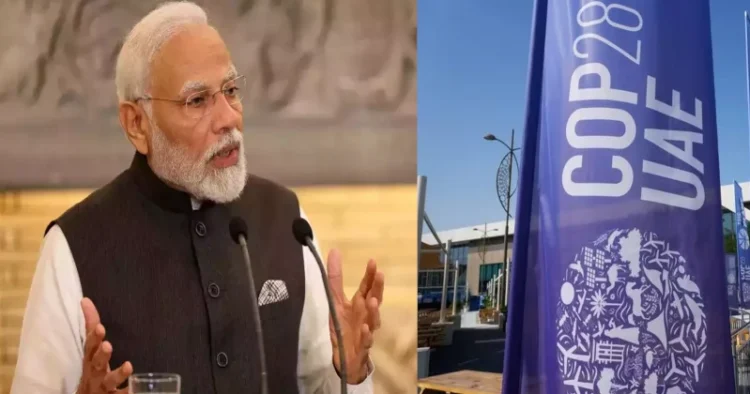Prime Minister Narendra Modi will present India’s stand on the burning climate change issues in Dubai this week at the World Climate Action Summit. His views on the issue of climate change will take a cue from India’s Sanatana tradition based on treating the Earth as the Mother.
PM Modi will attend the Summit at the invitation of Sheikh Mohamed bin Zayed Al Nahyan, President of the United Arab Emirates (UAE) and Ruler of Abu Dhabi. In the run-up to Modi’s ensuing visit, the Prime Minister’s Office has taken feedback from a host of experts, including Dehradun-based renowned environmentalist Padma Bhushan Anil Prakash Joshi.
The Summit is the High-Level Segment of the 28th Conference of Parties (COP-28) to the United Nations Framework Convention on Climate Change (UNFCCC). COP 28 is being held from November 28 to December 12 under the Presidency of the UAE.
Joshi, a proponent of economic development in harmony with ecological balance, has developed a model known as Gross Environmental Product (GEP) for the state of Uttarakhand. GEP is an ecological growth measure parallel to Gross Domestic Product (GDP).
The concept of GEP has been accepted by the Uttarakhand Government as a growth measure on Environment Day (June 5), 2021. The operational GEP model, developed by Joshi, is expected to be adopted by the state government in the immediate future.
In his briefing to a PMO official, Joshi highlighted the importance of propagating GEP in global platforms like COP28 in Dubai where Modi will deliver a special address sharing India’s traditional wisdom on environment protection in the context of the United Nations’ Sustainable Development Goals (SDG).
“Let the world adopt a tangible model to share performances in soil conservation, water harvest, air purity and afforestation,” Joshi said adding that the Himalayan state of Uttarakhand has such a unique ecological model in place for the world to take cue.
He said his unique model of GEP is based on the performance accounting for the four climate change parameters – soil, water, air and forest.
Joshi said the Uttarakhand government has accepted his GEP concept in principle but has yet to operationalise it as the model awaited ratification by global experts. He hoped the GEP model would be adopted soon as the model has already been published in the globally renowned United Kingdom-based publication ‘Ecological Indicators this year after a review of the model by global experts.
Dehradun Declaration
Joshi is known for his more than four decades of work on developing sustainable technologies that strike a balance between ecology and economic development. Joshi favoured experts to deliberate on the recommendations of the last five editions of the World Congress on Disaster Management (WCDM) in the ongoing sixth edition in Dehradun from November 28 to December 1.
“I personally feel that this WCDM edition should review the outcomes of the last five editions, what may happen tomorrow in the sphere of climate change, how the nature of disasters has undergone changes, and how well prepared we can be to face challenges in natural disasters,” Joshi said.
In the course of the next couple of days, Modi will outline India’s stand at the COP28 in Dubai based on the country’s age-old wisdom on environmental protection, while the WCDM in Dehradun will come out with a consensus declaration on how to mitigate natural disasters with efficient response so that the first victim can be instantly provided with relief and rescue measures.
“We need to come up with concrete strategy or mechanism to reach out to the first victim of a disaster as part of the climate change discourse,” Joshi said.
Hope WCDM’s latest edition comes up with a practical agenda-setting ‘Dehradun Declaration’ for the rest of the world to follow to face challenges posed by the subject of disaster management. The WCDM’s ‘Dehradun Declaration’ will be made public on December 1, the concluding day of the four-day global event in the Himalayan State.


















Comments